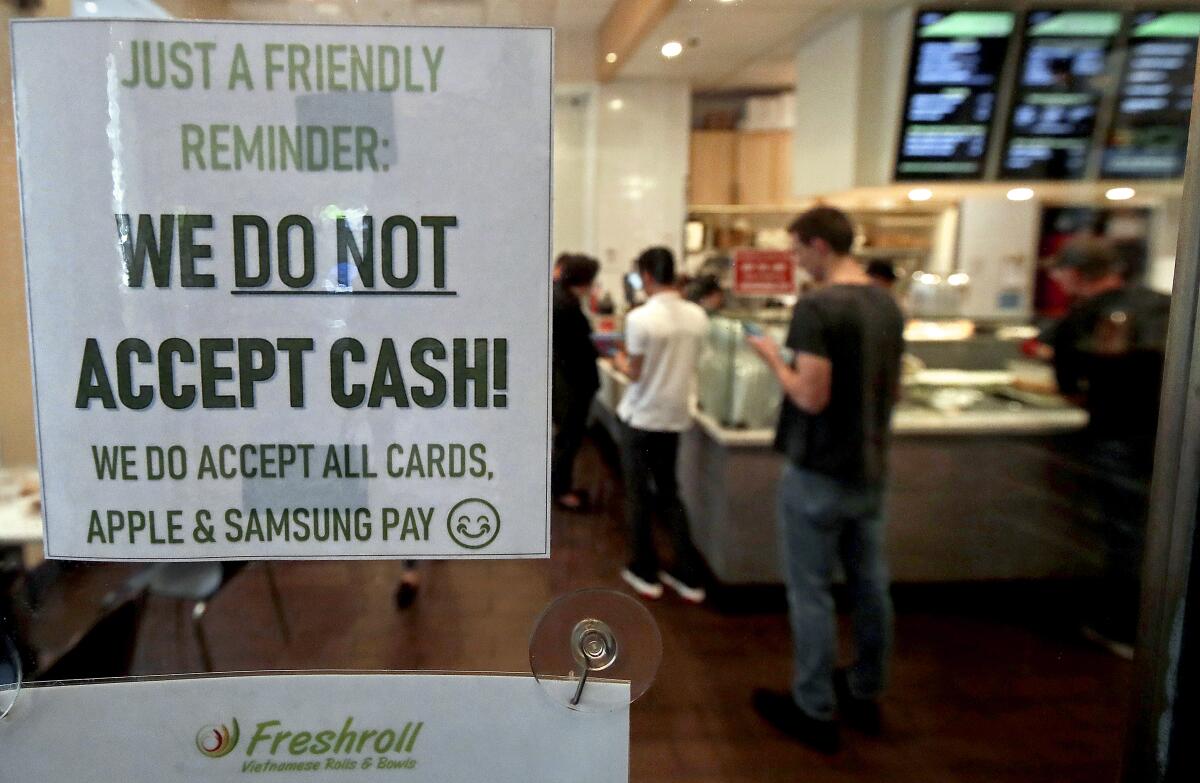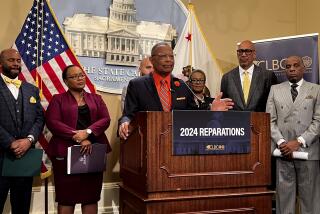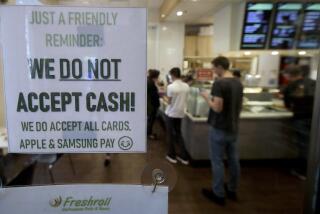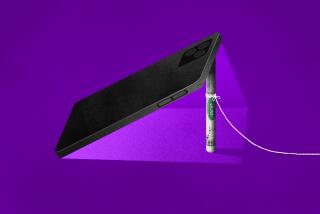Column: As coronavirus surges, more stores are going cashless. The price tag is racism

With coronavirus cases on the rise yet again, I knew it was only a matter of time before the sign appeared on the door of my favorite coffee shop.
“PLEASE NO CASH PAYMENT AT THIS TIME. CREDIT CARD AND CONTACTLESS PAYMENT ONLY.”
None of the baristas want to handle wads of potentially contagious dollar bills that customers pull from their pockets, especially with some counties halting or reversing their reopening plans and officials from other counties openly worrying that California is starting to lose the battle against COVID-19.
Early on, in fact, Gov. Gavin Newsom’s administration advised retailers to install systems that let people pay from afar to minimize opportunities for the coronavirus to spread. And in response, cash wasn’t accepted when public golf courses reopened in the city of Los Angeles, nor when a smattering of businesses opened their doors again in Manhattan Beach and Pasadena.
All of this has renewed talk about a “cashless society” potentially being within reach. According to a recent survey commissioned by Square, the San Francisco-based mobile payment giant, small business owners believe the nation will completely ditch paper money in a little more than a decade and that the pandemic will accelerate the switchover.
“On average, small business owners now think the U.S. will become cashless six years sooner than they predicted last year when asked the same question,” according to the survey.
Permit me a word of caution.
As we rush into this brave new, supposedly safer world brought to you by California’s tech industry, know that there will be trade-offs. Like so many of the policies and strategies that we’ve deemed necessary to combat the coronavirus, from shutting down the economy to the jobs we chose to spare as “essential,” this will almost certainly exacerbate existing racial inequities.
Consider that about 6.5% — or 8.4 million — American households don’t have a checking or a savings account with a bank, according to a survey from the Federal Deposit Insurance Corp. The vast majority of them are Black or Latino — the same people who are getting COVID-19 at disproportionate rates, are losing their jobs at disproportionate rates and, in California, are so poor that they are becoming homeless at disproportionate rates.
That’s why it was a bit troubling to read the results of another round of research from Square.
In early March, according to the company, only 8% of the many retailers using its products across the U.S. were effectively cashless — or, in other words, accepting at least 95% of their transactions with credit or debit cards or through some other contactless method. By mid-April, it had climbed to 31%.
In Los Angeles County, the businesses that had all but moved away from cash grew from 8% in early March to 31% in late April, and has settled around 25% in mid-June, according to Square.
I suspect the percentage of these businesses will rise again in the near future, given the spike in coronavirus cases and hospitalizations for COVID-19 across the country and in Southern California, in particular.
The incentive is certainly there for businesses to do it. What’s more, there’s nothing to stop them.
L.A., like most cities, doesn’t prohibit brick-and-mortar businesses from going completely cashless. Hence, my favorite coffee shop. Philadelphia does, though, along with all of New Jersey and Massachusetts.
And then there’s San Francisco, which, as far as I can tell, is one of the few cities in California — along with West Hollywood — to require all businesses to continue taking dollar bills. Former Supervisor Vallie Brown, who is running to win back her District 5 seat in November, proposed the ordinance last year, driven by the issue of inequity.
“A large population of people just didn’t have credit cards and they didn’t have bank cards,” she told me. “When I started to talk to people about why, they were like, ‘We can’t afford bank fees. We live paycheck to paycheck and you have to have a certain amount in your bank account. That last $50, we’re going to need it for food.’
“People who are living really on the edge, they cannot afford $20 or $50. They just can’t do it.”
This is especially true in California, which has the highest poverty rate in the nation — about 18%, according to the Census Bureau — when the cost of living, namely housing, is factored into the equation.
We also have the most homeless people, the vast majority of whom don’t use banks.
Also, undocumented immigrants make up 10% of the state’s workforce and are overrepresented in providing essential services such as healthcare, food and construction. They, too, often lack bank accounts because, as Brown put it, “they’re scared of federal government, which they should be.”
What’s heartening is that this whole cashless society thing isn’t a done deal yet. There is still plenty time to be thoughtful about how we work through the many inequities that have been revealed by the pandemic, especially with the economy.
Other cities should consider bans along the lines of what’s on the books in San Francisco. Because even as that city came to an abrupt halt over COVID-19, reopened its economy and has started shutting it down again, Supervisor Dean Preston said there hasn’t been any pushback.
California’s tech revolution must be inclusive.
“If someone comes into your store, and they have cash and they say they don’t have the credit card, for someone to say, ‘I’m sorry, I can’t help you.’ We need to step back and say, ‘this isn’t right,’” Brown said. “This may be all they have.”
More to Read
Sign up for Essential California
The most important California stories and recommendations in your inbox every morning.
You may occasionally receive promotional content from the Los Angeles Times.











